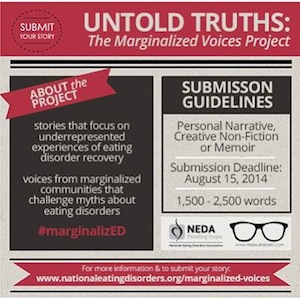Eating Disorders and Diverse Populations
As a voice for eating disorders awareness, education, and advocacy, I am glad to have a platform such as this blog where my voice can be "heard." Too often, popular media portrays a one-dimensional view of eating disorders. That said, I struggle with the fact that I am the exact stereotype that you see on television and in movies. I am a Lifetime Movie or After School Special waiting to happen. I am white, female, young, heterosexual, intelligent, middle class, and anorexic.
These facts don't make my story any less valid -- and they don't make yours any less valid either if you share these traits with me. However, when I say out loud that I have an eating disorder, I can do so with the assumption that people have heard of my eating disorder and will generally believe me when I tell them. The shock value, as it were, is minimal.
Furthermore, when I enter a treatment facility, I can rest assured that there will be women who look like me. This is true also of any community support group across the country. Any fears I have of entering a group are somewhat abated by the recognition of women who look, think, talk, and act like me. This "universality" is part of what makes group work therapeutic.
Eating Disorders and Minorities
So what happens when you walk into a group to find you are the only person of color there? Or the only male? Or the only person over the age of thirty? Or the only person with a disability? How are the cultural or lifestyle factors that influence your eating disorder different from the rest of the group? Are they discussed?
Will your voice even be heard?
I have been in treatment or in groups with men, women, people of color, older adults -- a whole range of diverse personalities, but they are the minority. And sometimes that means they are afraid to speak up and share their truth. And sometimes, their truth is drowned out by the sea young, white girls.
[caption id="attachment_3095" align="alignleft" width="300" caption="www.nationaleatingdisorders.org"] [/caption]
[/caption]
Today's blog is less about what I have to say and more about what you have to say. What is your story? I have to commend the National Eating Disorders Association (NEDA) for their "Untold Truths Project." If your story is one that isn't usually heard, they are asking to hear it.
Your voice and your story are so very important to our understanding of eating disorders. Your voice and your story are what make politicians take note and set aside funding for eating disorder research. Your voice and your story let people know that they are not alone.
Please consider sharing your story with NEDA's Untold Truths Project. And if that seems too daunting, consider sharing your story (even anonymously) in the comments section of this blog. Your voice matters, and the floor is open.
APA Reference
Hudgens, J.
(2014, July 22). Eating Disorders and Diverse Populations, HealthyPlace. Retrieved
on 2026, March 4 from https://www.healthyplace.com/blogs/survivinged/2014/07/eating-disorders-and-diverse-populations
Author: Jessica Hudgens
I'm a Greek-Cypriot woman, working class background, intelligent, tenacious, 35yrs-old who's battled compulsive overeating, bulimic tendencies (though not not "full-blown" bulimia" and self-harm since my teens. I joined an OA group for a couple of years but even though that did help me, it didn't help me enough so I've since left. That's not a criticism of OA in any way at all but it simply wasn't the right fit for me. I'm now looking to attend Smart Recovery meetings because I'm already using some of their tools and they're helping. I have only told three people about my disorder because I feel that it's not widely understood, particularly by those who have never suffered from an eating disorder and I fear that there's also the risk that people will think me greedy, that they won't believe that it's a real disorder. And that's my story I guess:) And thank you for your blogs, I always feel moved and somehow understood and connected when I read them despite the differences in our EDs.
Have a wonderful day!
Nataliaa,
Thanks so much for your comment! I certainly understand the feeling of not telling others because they won't understand your eating disorder - especially in the cases of bulimia and binge eating. I am "lucky" in the sense that anorexia is somewhat revered in our modern society and even if people don't understand my ED, they don't judge me harshly for it. I'm glad you are looking into Smart Recovery meetings - not all treatments or groups work for everyone. I hope they help!
Jess